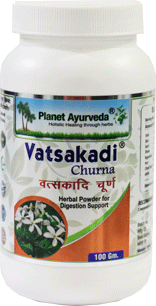Vatsakadi Churna – A Herbal Remedy For Ulcerative Colitis

What is Ulcerative Colitis?
Ulcerative colitis is an inflammatory disease of the colon (Large intestine), characterized by inflammation, irritation, and formation of tiny ulcers in the inner lining of the colon.
Causes
The exact cause of the disease is not known but some of the factors which cause Ulcerative colitis are mentioned below:-
- Genes
- Stress
- Improper diet
- Decreased immunity
Clinical Features
It can present with the following features :
- Rectal bleeding
- Mucous in the stool
- Sharp rectal pain
- Pain in the abdomen
- Loss of appetite
- Fever
- Weight loss
- Malnutrition
- Tiredness
- Dehydration
- Urge to pass stool

Types of Ulcerative Colitis
It can be of 4 types
Pan Ulcerative Colitis/ Pancolitis
The word “Pan” stands for the whole. When the whole colon or large intestine is involved, it is Pan ulcerative colitis. It can lead to various severe complications. Symptoms include – Loose stools, severe pain in the abdomen and extensive weight loss.
Left Sided Colitis
Descending colon is the part of the colon present on the left side. In this type mainly the descending colon is involved. Symptoms include – Bleeding, loose stools, severe pain in the left side of the abdomen, loss of appetite and weight loss.
Ulcerative Procititis
It affects the small area i.e. Rectum. This type is associated with fewer complications.
Proctosigmoiditis
This type of Ulcerative colitis mainly affects the Recto sigmoid colon. Symptoms include – Bleeding, urge to pass stool and abdominal cramping.
Ayurvedic Perspective of Ulcerative Colitis
According to Ayurveda, there are three energies found in our body – Vata, Pitta, and Kapha, when the imbalance occurs between them, then the disease occurs. Ulcerative colitis is a disease of Pitta and Vata doshas. Vata dosha in the colon, resulting in aggravation of Pitta and Kapha doshas. Excessive consumption of Pitta aahar affects the Rakta (blood) and Mamsa dhatu (muscular layers of the intestine), resulting in inflammation, excessive mucous production, toxin accumulation, and ulcer formation.
Vatsakadi Churna for Treatment of Ulcerative Colitis
Planet Ayurveda offers the best herbal treatment for Ulcerative colitis. All products are pure, natural, and vegetarian. All products are manufactured under the direct supervision of MD Ayurvedic Doctors by strictly following the principles of Ayurveda. These are not having any side effect so can be used for prolonged period of time. These are safe to use and are chemical and preservative-free. Vatsakadi churna is very beneficial in managing Ulcerative colitis
Its description is as follows
Vatsakadi Churna
It is a pure natural herbal formulation used for the treatment of Ulcerative colitis. This product is free from side effect and is safe to use.
Herbal Composition
Vatsakadi Churna is composed of a variety of pure, natural herbs like Bilva (Aegle marmelos)
- Bilva (Aegle marmelos)
- Anar (Punica grabatum)
- Chotti Elaichi (Elettaria cardamomum)
- Jaiphal (Myristica fragrans)
- Kutaz (Holarrhena antidysenterica)
- Nagarmotha (Cyperus scariosus)
- Saunf (Foeniculum vulgare)
- Dhania (Coriandrum sativum).
Benefits of Vatsakadi Churna
In ulcerative colitis, the intestine is the main target organ. Vatsakadi churna mainly acts on the intestine. Each component serves its individual benefits, which are as follows –
1. Bilva (Aegle marmelos)
Bilva is helpful in treating digesting system disorders and it also helps to balance the vitiated vata doshas. Ulcerative colitis occurs due to vitiated vata and pitta in the body. Loss of appetite and weakness are its features. Bilva helps in managing these features, thus helpful in managing Ulcerative colitis.
2. Anar(Punica grabatum)
Pomegranate is a good appetizer and is used to increase the digestive fire. In ulcerative colitis patients, loss of appetite is seen so anar helps in increasing their appetite and digestive fire.
3. Chotti Elaichi (Elettaria cardamomum)
Choti elaichi is a good mouth freshener and it is used in various respiratory diseases. It is very beneficial for our digestive system, as it improves the digestion and helps in improving the symptoms related to Ulcerative colitis.
4. Jaiphal (Myristica fragrans)
Jaiphal acts as an analgesic and helps in relieving abdominal and rectal pain. It also acts as a stimulant and is effective in improving digestion and also helps to improve the symptoms related to Ulcerative colitis.
5. Kutaz (Holarrhena antidysenterica)
Kutaj is very helpful in treating dysentery, associated with Ulcerative colitis. It also acts as a tonic and carminative (relieves flatulence).
6. Nagarmotha (Cyperus scariosus)
Nagarmotha is a good carminative, beneficial to manage flatulence and is very helpful to manage loose. In other words, it is very beneficial to treat symptoms related to Ulcerative colitis.
7. Saunf (Foeniculum vulgare)
Saunf is very good for our digestion and it helps in improving digestive problems like loss of appetite, indigestion, etc.
8. Dhania (Coriandrum sativum)
Dhania contains various chemicals and enzymes which are very beneficial in curing abdominal pain, rectal pain, fever and indigestion, related to Ulcerative colitis. Dhania pacifies the three doshas in the body and also promotes the digestive fire.
Ancient Verse About Dhania (Coriander sativum) – It Is As Follows

(Reference – Bhavaprakasha nighantu, Verse 86-88, Shloka no-33-35)
Meaning – Various synonyms and properties of Dhania have been explained in this verse.
Synonyms
Dhana, dhenukadhanyaka, dhanak, dhanya, vitunnaka, kunti,chhtra and Kusutumbru.
Properties
Dhania is bitter, astringent, light, unctuous and pungent in taste with hot in potency. Fresh dhania is sweet in taste and pacifies pitta doshas only. It pacifies excessive thirst, burning sensation in the body and all three doshas. It is very helpful in controlling cough, respiratory diseases, worm infestation and debility. It helps in promoting digestive fire and is used to manage all kind of fever.
Dosage – 1 teaspoonful twice daily with plain water after meals.
Boil 1 teaspoonful powder in 400 ml of water. Keep it boiling until it remains 50 ml. Strain it, leave the residue and drink the water. Use it twice daily. Make fresh preparation every time.






